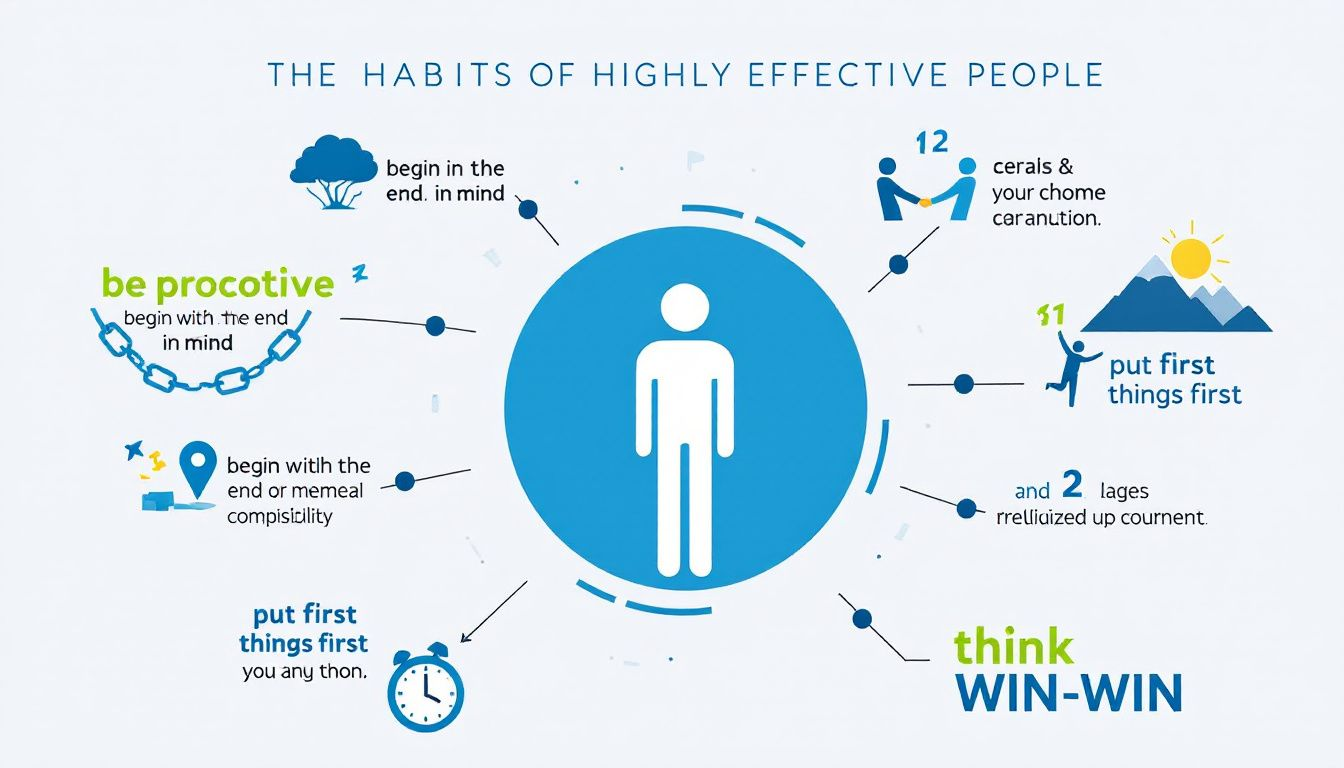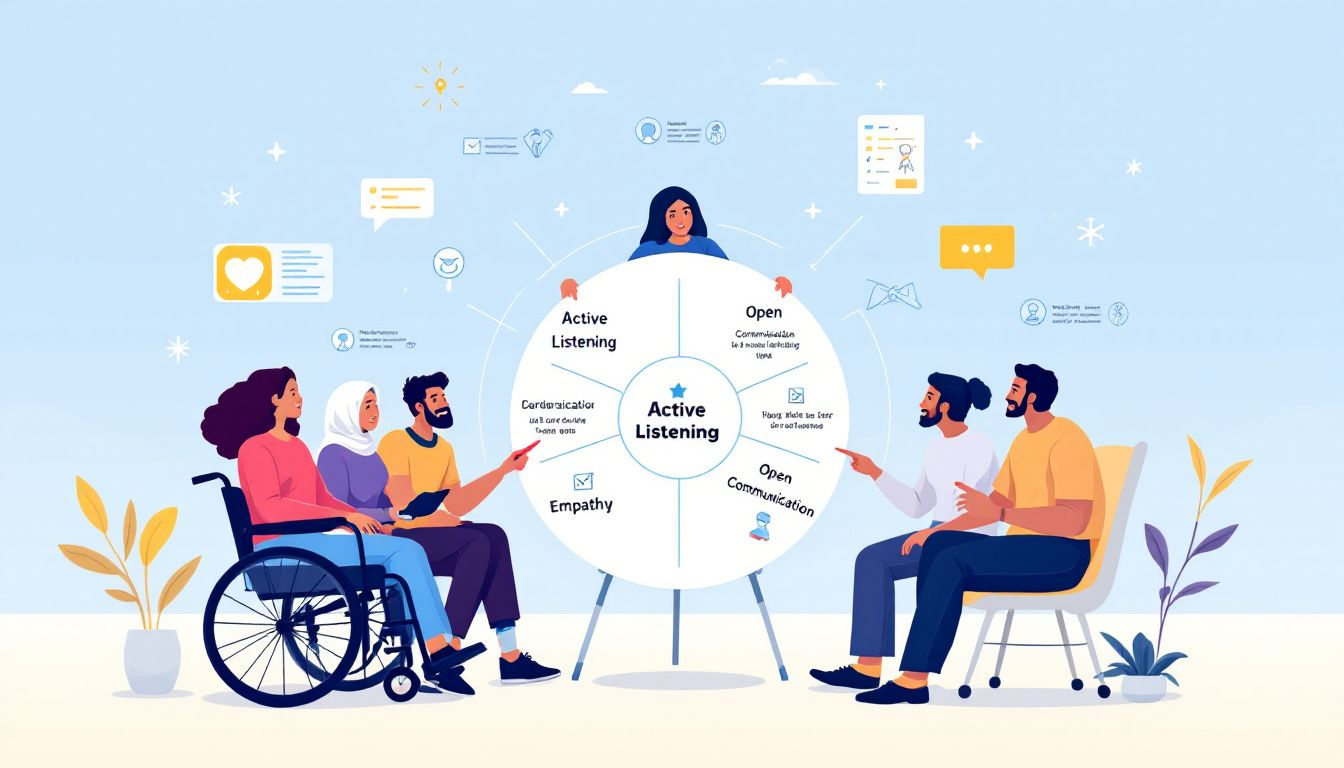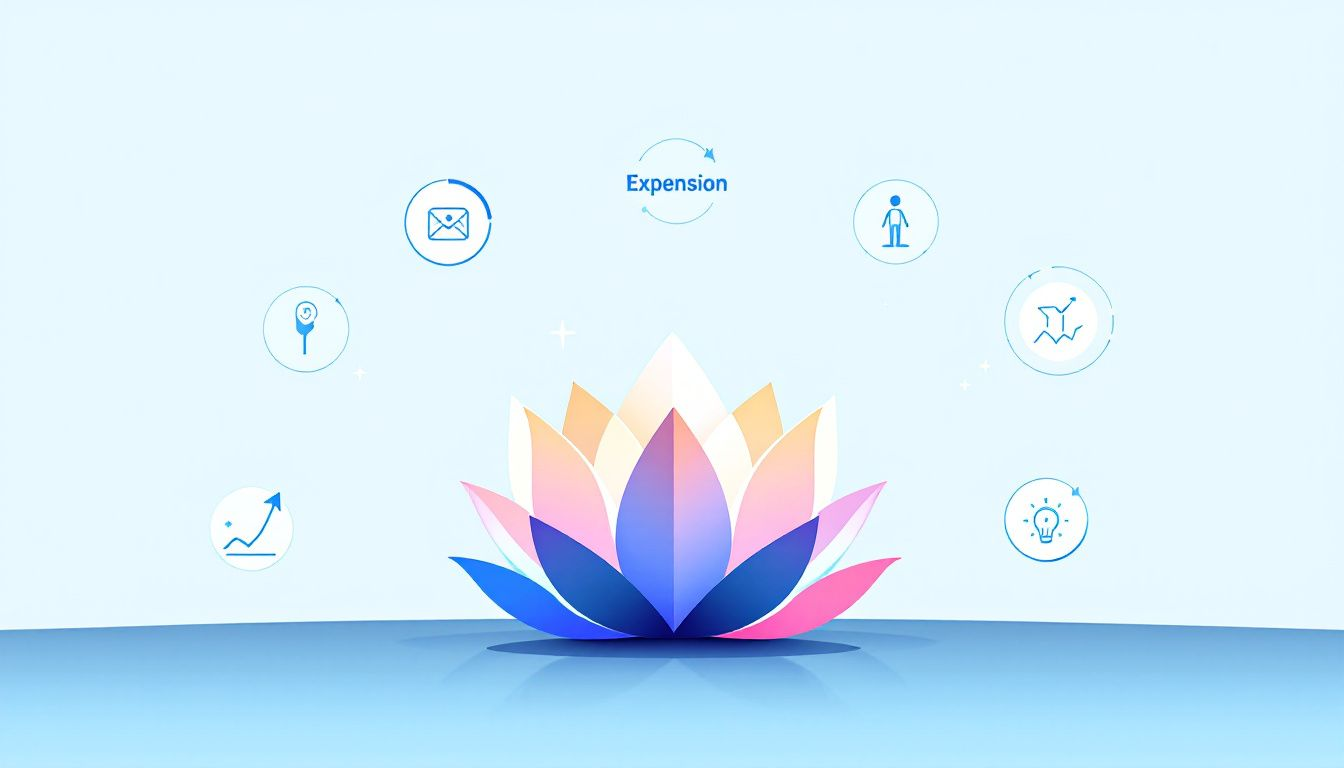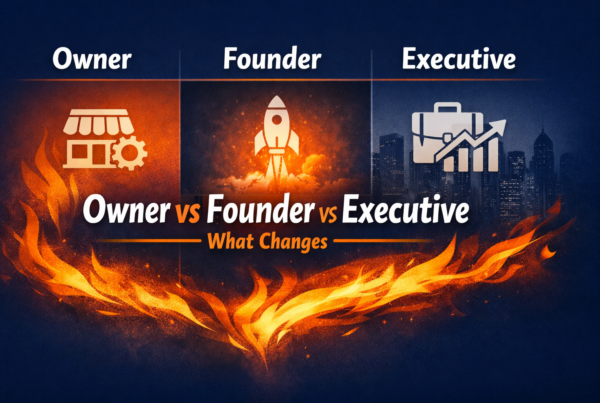The 7 Habits of Highly Effective People: Practical Tips for Success
Looking to achieve greater success in your personal and professional life? ‘The 7 Habits of Highly Effective People’ by Stephen Covey outlines essential habits for lasting effectiveness. This article will explore these habits and offer practical advice for making them part of your routine.
Key Takeaways
- Adopt the 7 Habits of Highly Effective People to enhance personal and professional productivity through self-leadership and emotional intelligence.
- Emphasize personal mastery by focusing on proactive behaviour, clear goal setting, and prioritization of essential tasks for greater effectiveness.
- Foster collaborative relationships through Win-Win thinking, empathetic communication, and leveraging diverse strengths for continuous personal and organizational growth.
Ready to implement these habits into your life and see real results? Let’s work together to create your personal roadmap for success. Book a free 15-minute consultation now!
The 7 Habits of Highly Effective People: Practical Tips for Success

Stephen Covey’s “The 7 Habits of Highly Effective People” outlines seven transformative principles essential for achieving personal and professional effectiveness. These habits advocate for principle-centered leadership, focusing on core skills such as emotional intelligence, proactive problem-solving, and self-leadership. Covey discusses how these habits form a comprehensive framework for better personal productivity by enhancing essential human skills crucial in today’s technology-driven workplaces.
At the heart of these habits is the idea of emotional intelligence, which allows individuals to connect better with others and foster more effective relationships. A balanced approach to productivity requires simultaneous focus on production and production capability, ensuring that you not only achieve your goals but also maintain the ability to adapt to changes effectively.
Integrating these habits into your daily routine fosters lasting success and excellence in both personal and professional spheres.
Introduction
The origins of “The 7 Habits of Highly Effective People” are deeply rooted in Stephen Covey’s desire to provide a compass for navigating life’s challenges. Drawing from timeless principles, Covey aimed to help individuals develop a deep understanding of key lessons that are essential for personal and professional growth. The framework he created offers a structured approach to personal development, focusing on both internal character and external behavior.
In a world where distractions are abundant, these habits guide us to prioritize important tasks and take responsibility for our actions. Adopting these principles aligns your actions with long-term goals and mission statement, leading to a more fulfilling and productive life.
The world’s leading foundry group, X-FAB, used the 7 Habits framework to address organizational challenges and enhance productivity.
This guide will help you understand the habits and offer practical tips for integrating them into your routine, ensuring you achieve your desired outcomes.
Introduction to the Seven Habits
The Seven Habits of Highly Effective People is a timeless and universal framework for personal and professional development. Developed by Stephen Covey, the habits are designed to help individuals become more effective in their personal and professional lives. The habits are based on principles of effectiveness, such as fairness, integrity, honesty, and human dignity. By adopting these habits, individuals can improve their personal relationships, increase their productivity, and achieve their goals.
The Seven Habits are divided into three categories: Private Victory, Public Victory, and Renewal. The Private Victory habits focus on personal effectiveness, while the Public Victory habits focus on interpersonal effectiveness. The Renewal habit focuses on continuous improvement and self-renewal. By mastering the Seven Habits, individuals can achieve a high level of personal and professional effectiveness.
The Foundation of Personal Change
The foundation of personal change lies in understanding and implementing the seven habits of highly effective people. Covey’s book distills success into these transformative habits, providing a framework for lasting personal and professional effectiveness. These habits are designed to enhance essential human skills, making them vital for success in today’s technology-driven workplaces.
The framework encourages a focus on internal character development over external behavior. Covey posits that a person’s character, defined by integrity and maturity, is crucial for achieving effectiveness. Shifting your perspective and focusing on personal growth moves you from dependence and independence to interdependence, enhancing your personal and professional relationships.
This shift is essential for achieving greater levels of collaboration and effectiveness in all areas of life.
Private Victory: Building Personal Effectiveness

Before we can achieve public success, we must first master our private victories. The concept of Private Victory emphasizes achieving personal mastery before addressing public interactions. The first three habits focus on enhancing personal effectiveness and self-reliance, laying the foundation for personal growth and development.
Focusing on personal mastery and establishing desired outcomes builds the internal strength needed to face external challenges, enhancing a person’s ability to overcome obstacles.
Let’s delve into the first three habits that form the cornerstone of Private Victory: Be Proactive, Begin with the End in Mind, and Put First Things First.
Be Proactive
Habit 1, “Be Proactive,” emphasizes the importance of taking responsibility for your actions and focusing on things you can influence. Proactive individuals concentrate on their Circle of Influence, directing energy toward factors they can change rather than worrying about those they cannot. Adopting a proactive mindset grants greater control over your life and outcomes, enhancing personal productivity and overall effectiveness.
Proactive people use proactive language and prioritize important tasks, ensuring that they can achieve their goals despite external circumstances. This habit encourages you to take ownership of your actions and focus on solutions rather than problems, setting the stage for personal and professional growth.
Taking the first step towards a proactive life can be challenging. Let’s explore how you can take control of your outcomes today. Schedule your free consultation here.
Begin with the End in Mind
Habit 2, “Begin with the End in Mind,” is about creating a personal mission statement that guides your decisions and aligns your actions with long-term objectives. Defining your most important goals and desired life direction helps you make informed choices that lead to lasting success.
This habit encourages you to visualize your goals and prioritize important tasks that align with your mission statement. Focusing on continuous improvement and setting clear measures for success ensures your daily actions contribute to long-term aspirations.
Have a vision but not sure how to get there? Let’s define your mission and align your goals for success. Book your call now.
Put First Things First
Habit 3, “Put First Things First,” advises individuals to prioritize and focus on achieving the most important goals. This habit emphasizes the importance of prioritizing tasks that align with significant objectives, ensuring that important goals take precedence over less critical activities.
Effective time management involves prioritizing essential tasks over urgent distractions, helping you achieve better personal productivity and long-term success. Focusing on the most important goals and prioritizing them enables significant progress toward desired outcomes.
Public Victory: Enhancing Interpersonal Relationships

Once you’ve achieved personal mastery through Private Victory, the next step is to enhance your personal relationships through Public Victory. The concept of Public Victory emphasizes collaboration and interdependence, which are essential for building effective relationships after personal success. The habits of public victory enable individuals to develop interdependent relationships that facilitate collaboration towards common objectives.
Many organizations report improved collaboration and effectiveness by implementing the 7 Habits framework. Fostering interdependent relationships enhances personal and professional interactions, leading to increased profitability and overall effectiveness.
Collaboration and strong relationships are the cornerstones of success. Let’s uncover strategies to enhance your connections. Click here to book a consultation.
Think Win-Win
The Win-Win principle emphasizes the importance of seeking mutually beneficial outcomes in all interactions, moving away from a competitive mindset. Fostering a collaborative environment in personal and professional relationships, the Think Win-Win mindset promotes mutual benefit and lasting success.
Achieving a Win-Win scenario requires a balance of courage and consideration, fostering partnerships through empathy and confidence. An abundance mentality is essential for creating mutually beneficial interactions, recognizing that there are plenty of opportunities and resources for everyone.
Struggling to create mutually beneficial outcomes? Discover how to foster a Win-Win mindset in your life. Book your free 15-minute session today.
Seek First to Understand, Then to Be Understood
This habit emphasizes active listening and understanding others’ perspectives before expressing your own, facilitating better communication. Empathetic listening involves fully concentrating on the speaker to grasp their perspective before sharing your own views, enhancing trust and communication.
Prioritizing understanding others’ viewpoints builds trust and improves communication, leading to more effective interactions in both personal and professional settings. This habit encourages spending time to develop a deep understanding of others, which is a key lesson in building strong relationships.
Synergize
Synergizing involves combining diverse strengths and viewpoints to create innovative solutions that surpass individual contributions. Valuing differences and combining individual strengths achieves superior results collaboratively.
Effective collaboration relies on leveraging diverse perspectives and strengths to create solutions that are more impactful than individual efforts. This habit encourages achieving synergy by focusing on mutual benefit and prioritizing important tasks that drive growth and success, addressing any potential team building problem.
Continuous Improvement and Renewal

Continuous improvement and self-renewal are crucial for maintaining the effectiveness of the other habits. The seventh habit focuses on the importance of ongoing self-renewal to sustain effectiveness in all areas of life. By continually stretching and challenging yourself, you can achieve better personal productivity and personal growth.
Ongoing self-care is essential to prevent burnout and maintain overall effectiveness. Focusing on continuous improvement and personal development ensures lasting success and maintains the effectiveness of the habits in personal and professional life.
Unlock your full potential through continuous growth. Let’s craft a strategy tailored to your needs. Schedule your consultation now.
Sharpen the Saw
“Sharpen the Saw” emphasizes the need for balancing physical, emotional, mental, and spiritual renewal to maintain overall effectiveness. Engaging in renewal activities boosts energy and motivation, supporting overall effectiveness and preventing burnout.
Balancing physical exercise, emotional relationships, mental growth, and spiritual alignment is essential for holistic renewal. Effective self-renewal practices, such as exercise, healthy eating, and sufficient sleep, are crucial for maintaining resilience and personal growth.
Real-World Applications of the 7 Habits

The 7 Habits framework is designed to enhance essential human skills that are vital for success in today’s technology-driven workplaces. By integrating these habits into organizational cultures, many companies have seen significant improvements in personal productivity and team collaboration.
Let’s explore how some organizations have successfully applied the 7 Habits to drive growth and improve effectiveness. These real-world examples will demonstrate the practicality and impact of Covey’s principles in various business contexts.
Inspired by these success stories? Let’s work together to create yours. Book your free consultation here.
Driving Growth Through Employee Empowerment
Employee empowerment is key for companies aiming to achieve their growth targets in multiple markets. The global food production company leverages the 7 Habits to ensure employees are continually challenged and engaged, leading to better personal productivity and increased profitability.
Emphasizing individual accountability and team-oriented approaches stimulates growth and drives towards targeted growth goal. This approach highlights the importance of self-leadership and personal development in achieving synergy and organizational success.
Building a Culture of Leadership and Effectiveness
Mississippi Power faced drastic changes due to the deregulation of their industry, creating a need for robust leadership capabilities to navigate the evolving market. Adopting the seven habits, Mississippi Power has developed a framework for effective leadership that adapts to changes.
Implementing the seven habits has enhanced the company’s leadership culture, ensuring long-term organizational effectiveness and personal growth for its employees. This example underscores the importance of self-leadership and personal productivity in building a culture of leadership and effectiveness.
Bridging the Gap Between Planning and Execution
Birchwood Automotive Group established a common language and methodology to communicate and conduct business, bridging the gap between planning and execution. The implementation of the 7 Habits transformed the company’s culture, leading to increased profitability and better personal productivity.
Focusing on achieving synergy and aligning actions with significant goals has led to remarkable improvements in planning and execution processes. This example highlights the practical application of the habits in driving organizational success.
Turning Habits Into Action
Practical application of the 7 Habits involves small, actionable steps rather than major changes. By integrating the habits into daily routines, you can foster both personal mastery and strong interpersonal relationships.
Setting clear measures for success is crucial for effectively applying the habits in personal and professional life. Taking these actionable steps turns the powerful lessons of the 7 Habits into lasting habits that drive personal and professional growth.
Summary
The journey through the “7 Habits of Highly Effective People” reveals a comprehensive approach to achieving personal and professional success. From the initial habits that focus on self-mastery and internal character development to the habits that emphasize effective interpersonal relationships and continuous improvement, Covey’s framework offers powerful lessons for lasting success. By being proactive, setting clear goals, prioritizing important tasks, fostering win-win relationships, practicing empathetic listening, synergizing, and engaging in self-renewal, you can transform your life and work.
As you integrate these habits into your daily routine, remember that the key to success lies in consistent application and continuous improvement. Embrace the principles of the 7 Habits, and watch as they lead you to greater personal productivity, stronger relationships, and a more fulfilling life. Let this guide be your starting point for turning these powerful concepts into actionable habits that drive your personal and professional growth.
Ready to take the lessons of the 7 Habits to the next level? Let’s design a customized plan for your growth. Click here to book your free 15-minute call today!
Frequently Asked Questions
What are the 7 Habits of Highly Effective People?
Embrace the power of the 7 Habits of Highly Effective People: Be Proactive, Begin with the End in Mind, Put First Things First, Think Win-Win, Seek First to Understand, Then to Be Understood, Synergize, and Sharpen the Saw. By integrating these habits into your everyday life, you set yourself on a path to greater effectiveness and success!
How can I apply the 7 Habits in my daily life?
You can transform your daily life by taking small, actionable steps—create a personal mission statement, prioritize important tasks, practice empathetic listening, and commit to continuous self-renewal. Consistent application of these habits will lead you to lasting success!
Why is being proactive important?
Being proactive is crucial because it empowers you to take control of your life, leading to better outcomes and increased productivity. Embrace this mindset, and watch your opportunities grow!
How does the Win-Win mindset benefit professional relationships?
Embracing a Win-Win mindset strengthens professional relationships by fostering collaboration and mutual benefit. This approach not only enhances your connections but also paves the way for greater success in your career.
What is the significance of continuous improvement and renewal?
Continuous improvement and renewal are essential for lasting effectiveness, preventing burnout, and fostering ongoing growth. Embrace these practices to unlock your full potential and thrive in all areas of life!



